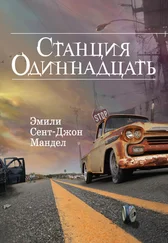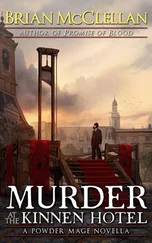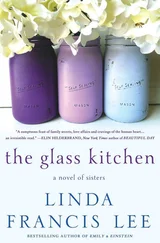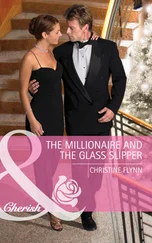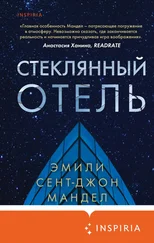“Well, cheers,” Marc said, and raised his glass. “Congratulations to the both of you. Wonderful news, just wonderful.”
“Can I ask…?” Louise said. “Big wedding, small…?”
“If we’d made any to-do about it at all,” Jonathan said, “you’d have been the first names on the guest list.”
“Would you believe,” Vincent said, “that we actually got married at city hall?”
“Good lord,” Marc said, and Louise said, “I like your style. Donna’s getting married—that’s our daughter—and my god, the logistics, the complications, all the drama, the headache of it, I’m tempted to suggest they follow your lead and elope.”
“There’s a certain efficiency to elopement,” Jonathan said. “Weddings are such elaborate affairs. We just didn’t want all the hoopla.”
“I had to convince him to take the day off work,” Vincent said. “He wanted to just go down there on his lunch break.” They were laughing, and Jonathan put his arm around her. She could tell he appreciated the improvisation.
“Was there a honeymoon?” Marc asked.
“I’m taking her to Nice next week, and then on to Dubai for the weekend,” Jonathan said.
“Ah, right,” Marc said, “I remember you telling me that you love it there. Vincent, have you been?”
“To Dubai? No, not yet. I can’t wait.” And so on and so forth. She didn’t want to be a liar but his expectations were clear. As a former bartender, she was accustomed to performing. The lies were troublingly easy. On the night when Jonathan had walked into the bar at the Hotel Caiette, someone had written terrible graffiti on the window, and she was standing there polishing glasses, counting the minutes till the end of her shift, wondering why she’d ever thought it was a good idea to come back here, trying to imagine the rest of her life and getting nowhere because of course she could leave and go work in another bar, and then another bar after that, and another, and another, but leaving Caiette wouldn’t change the underlying equation. The problems of Vincent’s life were the same from one year to the next: she knew she was a reasonably intelligent person, but there’s a difference between being intelligent and knowing what to do with your life, also a difference between knowing that a college degree might change your life and a willingness to actually commit to the terrifying weight of student loans, especially since she’d worked alongside enough bartenders with college degrees to know that a college degree might not change anything at all, etc. etc., and she was spiraling through that familiar territory, sick of her thoughts and sick of herself, when Jonathan walked into the bar. In the way he spoke to her, his obvious wealth and his obvious interest, she saw an opening into a vastly easier life, or at least a different life, a chance to live in a foreign country, a life of something other than bartending in a place other than here, and the opportunity was irresistible.
Lying about being married troubled her conscience, but not enough to make her want to flee. I’m paying a price for this life, she told herself, but the price is reasonable.
Variations
Jonathan never talked about Suzanne, his real wife, but the past wasn’t entirely off the table. Sometimes in a certain mood he liked to hear stories about Vincent’s life. She doled them out carefully: “When I was thirteen,” she told him once, lying in the bed on a Sunday morning, “I dyed my hair blue and got suspended from school for writing graffiti on a window.”
“Really. What did you write?”
“Would you believe I wrote a philosopher’s last words? I came across them in a book somewhere and loved them.”
“Precocious, but morbid,” he said. “I’m afraid to ask.”
“ Sweep me up. It has a certain beauty, don’t you think?”
“Maybe if you’re a temperamental thirteen-year-old girl,” he said, so she threw a pillow at him. She didn’t tell him that her mother had died two weeks earlier, or that her brother had been lurking around and saw her do it, or that she had a brother. It is possible to leave so much out of any given story.
—
Also, it wasn’t morbidity, she found herself thinking on the train into the city the following afternoon. It was almost the opposite. She’d never had a clear vision of what she wanted her life to look like, she had always been directionless, but she did know that she wanted to be swept up, to be plucked from the crowd, and then when it happened, when Jonathan extended a hand and she took it, when she went in the space of a week from the mildew-plagued staff quarters of the Hotel Caiette to an enormous house in a foreign country, she was surprised by how disorienting it was, and then surprised by her surprise. She got off the train at Grand Central and let herself be absorbed into the flow of pedestrian traffic down Lexington Avenue. How have I come to this foreign planet, so far from home? But it wasn’t just the place, it wasn’t even mostly the place, it was mostly the money that made it foreign and strange. She wandered over to Fifth Avenue with no particular destination in mind, and walked until a pair of buttery yellow leather gloves in a window caught her eye. Everything in the shop was gorgeous, but the yellow gloves shone with a special light. She tried them on and bought them without looking at the price tag, because in the age of money her credit card was a magical, weightless thing.
She left the boutique with the gloves in her handbag and found her thoughts drifting a little as she walked. Her life in those days was so disorienting that she often found herself thinking about variations on reality, different permutations of events: an alternate reality where she’d quit working at the Hotel Caiette and returned to her old job at the Hotel Vancouver before Jonathan arrived, for example, or where he decided to get room service that morning instead of sitting at the bar and ordering breakfast, or where he did sit at the bar and order breakfast but he didn’t like Vincent; an alternate reality where she still lived in the staff quarters of the Hotel Caiette, serving drinks to wealthy tourists all night, years passing. None of these scenarios seemed less real than the life she’d landed in, so much so that she was struck sometimes by a truly unsettling sense that there were other versions of her life being lived without her, other Vincents engaged in different events.
She’d read newspapers all her life, because she felt that she was desperately undereducated and wanted to be an informed and knowledgeable person, but in the age of money she would often read a news story and find herself uneasily distracted by its opposite: Imagining an alternate reality where there was no Iraq War, for example, or where the terrifying new swine flu in the Republic of Georgia hadn’t been swiftly contained; an alternate world where the Georgia flu blossomed into an unstoppable pandemic and civilization collapsed. A variation of reality where North Korea hadn’t fired test missiles, where the terrorist bombings in London hadn’t happened, where the Israeli prime minister hadn’t suffered a stroke. Or spin it back further: a version of history where the Korean peninsula was never divided, where the USSR had never invaded Afghanistan and al-Qaeda had never been founded, where Ariel Sharon died in combat as a young man. She could only play this game for so long before she was overcome by a kind of vertigo and had to make herself stop.
Shield
One of the first things she bought was an expensive video camera, a Canon HV10. She’d been shooting video since she was thirteen, a few days after her mother disappeared, when her grandmother Caroline arrived from Victoria to help out. That first night of her grandmother’s visit, when Vincent was sitting at the table after dinner—drinking tea, which was a habit she’d picked up from her mother, and staring down the hill at the water because surely any minute now her mother would walk up the steps to the house—her grandmother brought a box to the table.
Читать дальше


